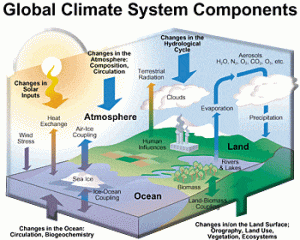Research interests include studying climate change
and variability during the the past, in order to better understand future climate projections. We are investigating the response of the climate system and its components to changes in radiative forcings, such as variations in orbital cycles and greenhouse gas concentrations. This allows us to assess the impacts of environmental change leading to mass extinctions.
The Paleocene Eocene Thermal Maximum: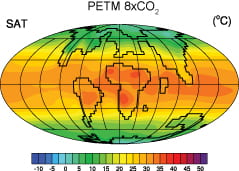
The transient global warming event characterized by a carbon cycle perturbation at the Paleocene-Eocene boundary (55 Mya), referred to as the Paleocene-Eocene Thermal Maximum (PETM), is of particular interest for evaluating our theoretical understanding of the complex processes that govern the carbon cycle, and for testing the sensitivity of coupled climate/biogeochemical models to extreme forcing. This warming event is regarded as a suitable analog for future climate change and uptake of carbon in the ocean.
Future Climate Change Simulations: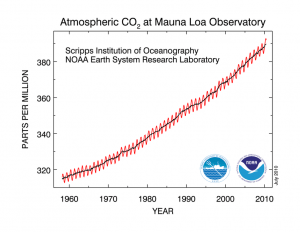
The potential for two-way interactions and feedbacks between the carbon cycle and the climate system comes from the radiative properties of CO2, other greenhouse gases, and other radiative forcings in the atmosphere. Increasing atmospheric CO2 through anthropogenic emissions from burning fossil fuels, for example, may lead to significant changes in climate, ocean circulation, and the magnitude and extent of continental ice sheets. In this study, the comprehensive Earth System Model from the Max-Planck-Institute for Meteorology has been applied to investigate these interactions.
Climate Change at the Permian-Triassic Boundary: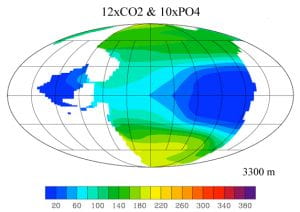
The causes and dynamics of the Permian-Triassic mass extinction remain uncertain. Gradual deterioration of marine and terrestrial environments during the Late Permian reflected in changes in seawater chemistry, atmospheric composition, and persistence of inhospitable conditions through the Early Triassic suggest that long-term factors such as changing climate were important. In this NSF-funded project we explore causes favorable for the widespread extinction events.
The Urban Heat Island of Dallas-Fort Worth: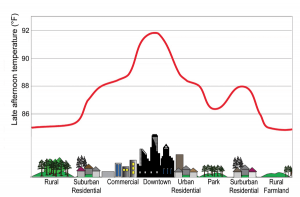
In this project sponsored by the UTA Research Enhancement Program, we investigate the urban heat island of the Dallas-Forth Worth metropolitan area.
This report is an initial assessment of the vulnerability of North Central Texas (NCT) transportation infrastructure as part of the FHWA Climate Change/Extreme Weather Vulnerability Assessment Pilot Study. It summarizes the results from a sequence of meetings organized by the North Central Texas Council of Governments (NCTCOG), attended by local experts, and supported by several local government agency stakeholders to create a qualitative assessment of extreme weather and climate change impacts on infrastructure assets with a focus on Dallas and Tarrant
Change/Extreme Weather Vulnerability Assessment Pilot Study. It summarizes the results from a sequence of meetings organized by the North Central Texas Council of Governments (NCTCOG), attended by local experts, and supported by several local government agency stakeholders to create a qualitative assessment of extreme weather and climate change impacts on infrastructure assets with a focus on Dallas and Tarrant
Counties (which includes the primary cities of Dallas and Fort Worth).
Abrupt Climate Change at the Last Deglaciation:
The Younger Dryas is characterized by significant changes in surface temperatures, overturning of the deep-sea circulation and marine productivity. Comparison of temperature reconstructions from Greenland ice core records with those inferred from strength of the Atlantic meridional overturning circulation indicates rapid changes in the climate due to a massive meltwater input into the North Atlantic. In this NSF-sponsored project we apply the community earth system model (CESM1) to investigate this rapid climate change.
Completed Research Projects
Interannual Variability of the Carbon Cycle
Data Assimilation of Chlorophyll and Parameter Sensitivity of the Carbon Cycle
Scandanavian Ice Sheet During the Last Glaciation
Ocean Circulation During the Last Glacial Maximum
A Satellite View of Internal Waves During the indian Ocean Tsunami
